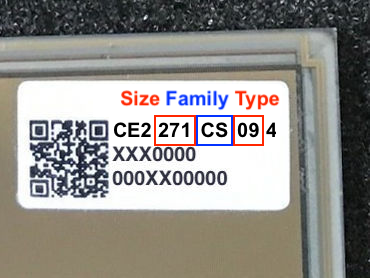Update from release 7 to release 8¶
This technical note lists how to update from release 7 to release 8.
The user guide has been adapted to new release 8. Special boxes provide the reference for legacy release 7.
New features¶
All the application libraries are unchanged, except the File and Serial libraries.
The File ans Serial functions now return a result, RESULT_SUCCESS if successful and RESULT_ERROR otherwise, to be checked before updating the screen.
The screen libraries now read the OTP memory for optimal image quality.
New EXT4 extension board¶
The EXT4 extension board and the dedicated variant PDLS_EXT4_Basic_Matter support the monochrome screens with wide temperature and embedded fast update (film K) up to 2.90”.
The Basic edition of legacy release 8 includes the variant EPDK_EXT4_Basic_Matter, aimed at the EXT4 Extension Board and the E-Paper Development Kit for Matter (EPDK-Matter). It supports the small screens with wide temperature and embedded fast update (film K), like the 290-KS-09 screen included in the kit.
The dedicated variant PDLS_EXT4_Basic_Matter of the Basic edition targets the E-Paper Development Kit for Matter (EPDK-Matter) and monochrome screens with wide temperature and embedded fast update (film K).
This is the recommended procedure for the monochrome screens with wide temperature and embedded fast update (film K) on the EXT4 extension board.
It includes a specific board definition for the EXT4 extension board which lists all the GPIOs.
///
/// @brief Arduino Nano Matter with Silicon Labs MGM240P, tested
/// @details Variant of boardArduinoNanoMatter with panelPower, button and LED for EXT4
/// @note Numbers refer to pins
/// @note Recommended board
///
const pins_t boardArduinoNanoMatter =
{
.panelBusy = 10, ///< EXT3, EXT3.1 and EXT4 pin 3 Red -> D10
.panelDC = 9, ///< EXT3, EXT3.1 and EXT4 pin 4 Orange -> D9
.panelReset = 8, ///< EXT3, EXT3.1 and EXT4 pin 5 Yellow -> D8
.flashCS = 7, ///< EXT3, EXT3.1 and EXT4 pin 8 Violet -> D7
.panelCS = 6, ///< EXT3, EXT3.1 and EXT4 pin 9 Grey -> D6
.panelCSS = NOT_CONNECTED, ///< EXT4 not available
.flashCSS = 5, ///< EXT3 pin 20 or EXT3.1 pin 11 Black2; EXT4 pin 16 Yellow2 -> D5
.touchInt = NOT_CONNECTED, ///< EXT3-Touch pin 3 Red
.touchReset = NOT_CONNECTED, ///< EXT3-Touch pin 4 Orange
.panelPower = 2, ///< EXT4 pin 11 White -> D2
.cardCS = NOT_CONNECTED, ///< Separate SD-card board
.cardDetect = NOT_CONNECTED, ///< Separate SD-card board
// EXT4 specific
.button = 3, // EXT4 pin 12 Grey -> D3
.ledData = 4, // EXT4 pin 13 Violet WS2813C -> D4
.nfcFD = 17, // EXT4 pin 17 Orange NFC NT3H2111_2211 !Field detect, I2C address = 0x55 -> A3
.imuInt1 = 16, // EXT4 pin 18 Red LIS2DH12 !INT1, I2C address = 0x19 -> A2
.imuInt2 = 15, // EXT4 pin 19 Brown LIS2DH12 !INT2, I2C address = 0x19 -> A1
.weatherInt = 14, // EXT4 pin 20 Black HDC2080 !INT, I2C address = 0x40 -> A0
// End of EXT4 specific
};
The specific board definition requires to set USE_EXT_BOARD to BOARD_EXT4 on the hV_List_Options header file, as described at Parameters.
#define USE_EXT_BOARD BOARD_EXT4 ///< Selected board
The general procedure mentioned above remains valid for the E-Paper Development Kit for Matter (EPDK-Matter) and monochrome screens with wide temperature and embedded fast update.
#include "PDLS_EXT4_Basic_Matter.h"
pins_t myBoard = boardArduinoNanoMatter;
Screen_EPD_EXT4_Fast myScreen(eScreen_EPD_290_KS_0F, myBoard);
The variable myBoard provides an easy access to other signals, like myBoard.ledData to drive the RGB LED or myBoard.button to read the button.
Deprecated features¶
Release 8 does not deprecate features.
Modified features¶
Screen models¶
Release 8 inaugurates a new naming scheme for the screen models, closer to the product numbers. The new naming scheme drops the suffixes _BWR, _BWRY, _Fast or _Wide; and includes instead the screen film and controller. The only remaining suffix is _Touch for the screens featuring touch.
The prefix of the screen model has been simplified from eScreen_EPD_EXT3 to eScreen_EPD. Similarly, the prefix of the frame-buffer has been shortened from frameSize_EPD_EXT3 to frameSize_EPD.
The screen model starts with eScreen_EPD, contains the size, the film and the controller taken from the product number and separated with a _.
The product number of the panel is printed on the back of the screen, on the top line close to the QR-code.
Example

The screen with product number CE2271CS094 corresponds to a 2.71” panel with film CS and controler 09. The last digit 4 is ignored.
| - | Size | Film | Controller | - |
|---|---|---|---|---|
CE2 |
271 |
CS |
09 |
4 |
eScreen_EPD |
_271 |
_CS |
_09 |
The screen model for the constructor is eScreen_EPD_271_CS_09.
Screen_EPD_EXT3_Fast myScreen(eScreen_271_CS_09, boardRaspberryPiPico_RP2040);
| Screen | Content |
|---|---|
PDLS_EXT3_Advanced_Global |
All monochrome and colour black-white-red screens, normal update mode |
PDLS_EXT3_Advanced_Fast |
Monochrome screens with embedded fast update, normal and fast update modes |
PDLS_EXT3_Advanced_Wide |
Monochrome screens with wide temperature and embedded fast update, normal and fast update modes |
PDLS_EXT3_Advanced_Touch |
Touch monochrome screens, normal and fast update modes |
PDLS_EXT3_Advanced_BWRY |
Colour black-white-red-yellow screens, normal update mode |
For more information about the screen model, please refer to the Model name explanation and The different types E Ink imaging film pages on the Pervasive Displays website.
GUI library¶
Because the GUI library uses the fast update mode, it requires a screen of type Screen_EPD_EXT3_Fast provided by the PDLS_EXT3_Advanced_Fast, PDLS_EXT3_Advanced_Wide or PDLS_EXT3_Advanced_Touch libraries.
Because the serial library manages windows, it requires a screen of type Screen_EPD_EXT3_Fast provided by the PDLS_EXT3_Advanced_Fast, PDLS_EXT3_Advanced_Wide or PDLS_EXT3_Advanced_Touch libraries.
Editions and variants names¶
Evaluation and Commercial editions¶
The names of the variants of the Evaluation and Commercial editions are unchanged.
Viewer edition¶
The name of the variant of the Viewer edition is unchanged.
Basic edition¶
The names of the variants of the Basic edition are unchanged.